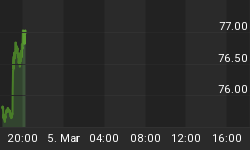Crude oil was off as much as 10 percent during Thursday's trading on the NYMEX, before closing the session 5 percent lower at $35.40. Reuters has the story.
"Oil prices fell more than 10 percent on Thursday to a one-month low as thickening economic gloom added to expectations that world energy demand would keep shrinking.
U.S. crude fell $3.74 to $33.54 a barrel by 1:30 p.m. EST, after falling as low as $33.20 -- the lowest since December 19. London Brent fell 90 cents to $44.18 a barrel, maintaining an unusual premium to the U.S. benchmark...
..."We have gotten more dire economic news and the notion is that 2009 will not result in any significant turnaround, with sentiment mounting that may happen in 2010 instead," said Jim Wyckoff, independent energy analyst in Cedar Falls, Iowa.
The gloomy global economic outlook prompted OPEC on Thursday to forecast a fall of 180,000 barrels per day in world oil demand this year, 30,000 bpd steeper than its previous forecast."
Aside from the bearish news of falling oil demand, one thing that jumped out at me from the Reuters article was the wide premium in Brent crude over NYMEX-traded WTI crude. "What accounts for this disparity between the benchmark crude prices?", I wondered.
Bloomberg honed in on the reasons for the price disparity and the fundamentals behind the recent oil price declines in their end of day report.
"Consumption of OPEC supplies will shrink 4.2 percent to 29.5 million barrels a day, according to a monthly report released today. The discount of oil in New York to the Brent grade in London widened to as much as $10.79 a barrel today, a record, because of rising supplies at Cushing, Oklahoma, the delivery point for barrels traded on the U.S. exchange.
"The overriding factor impacting the market is the fact that we are in the midst of a global recession, which is buffeting the U.S., even China," said Rachel Ziemba, an analyst at RGE Monitor, an economic research company in New York. "That's going to be a negative for oil demand.""
The demand destruction in oil has definitely been the big story for this market in recent months.
What a change from 2005-2007, when many observers worried that escalating oil prices would begin to choke off demand and slow the growth of booming economies.
Now everyone worries about a deepening of the global recession, wondering if we'll ever see $50+ oil again. Here's a quote from today's AP report summing up the current attitude:
" "The bull oil era is officially over," said Phil Flynn, an analyst at Alaron Trading Corp...".
I think that says it all, don't you? Still, it might be a little bit premature to right off a future rise in the price of crude oil.
Just as Matthew Simmons was a little early/wrong in his warnings last summer of $9 and $10 gasoline and possible oil shortages, I think the same might be said (in retrospect) about this latest call from Flynn.
It makes me wonder if this quote might be nearer to heralding a bottom in oil prices than anything else.
For starters, what is the "bull oil era", and how far into the future are we talking about here when calling for an end to higher oil prices? These are the specifics we need to define before taking such a call seriously.
To be fair, the AP report does contain more of Flynn's analysis than just this quotable quote, but it seems rather focused on the near-term supply and demand picture for oil. Not exactly a lot here to convince me that oil prices can't head back up to $45-$50+ in one or two year's time. That's certainly a small enough time frame to fit inside an "era" isn't it?
While most commodities (save gold) have suffered a severe correction this past year, and could easily be said to be in the midst of a bear market (cyclical for now), I think the long-term case for higher oil prices (steadily growing global demand meets shrinking supply) is still intact and could reassert itself in the not too distant future.
Oil's plunge to the downside was surprisingly quick and severe (as it was for many assets in 2008), but we may see demand for crude oil pick up if China and other developing nations start to come out of recession ahead of US and other developed nations.
What to do you think? Will crude oil prices be lower or higher over the next 1-2 years?















